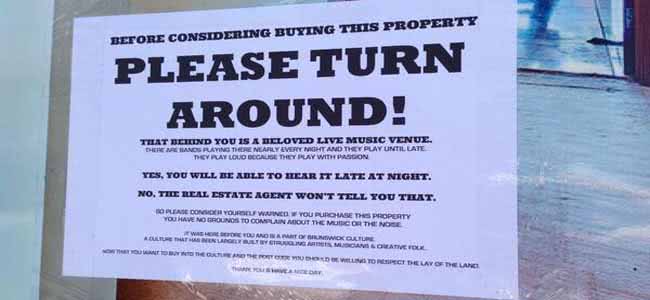The Melbourne live music scene has claimed a major victory in the ongoing struggles and costly fallouts of noise complaints from inner-city residents.
The Victorian State Government is set to introduce the ‘Agent of Change’ planning principle, the proverbial holy grail of policy changes, in which new residents to an area are responsible for costly noise controls and soundproofing as opposed to placing the onus on live music venues.
The Napthine government has vowed to implement Agent of Change policies as part of a raft of new red tape reforms to be announced today, all designed to allow small venues to host live music, as The Age reports.
The new reforms were pushed forward during the last sitting day of State Parliament in 2013 by Planning Minister Matthew Guy, who has been a key figure in rebuffing the controversial luxury apartment application that has been threatening the iconic Palace Theatre.
Minister Guy used the final Parliament sitting to declare that the Napthine administration would do whatever it could to implement the Agent of Change principle in the government’s planning schemes.
“Whether it is through a state amendment or a local planning scheme amendment, we will find a way,” the Planning Minister said.
“More to the point, we will find a way to give certainty to that industry and to that section of the population that enjoys what is one of Melbourne’s greatest tourism and cultural assets.” “Whether it is through a state amendment or a local planning scheme amendment, we will find a way.”
Love Music?
Get your daily dose of metal, rock, indie, pop, and everything else in between.
The surprise news arrives just days after the industry warned that Melbourne’s live music scene could shift to Sydney if the tide of noise complaints was not stemmed, and following a year of flux for the city’s live music sector, culminating in the Bendigo Hotel dodging a costly legal dispute stirred by a single resident’s noise complaints and The Empress abruptly shutting its doors.
According to a government spokesman, work is already under way to implement the Agent of Change principle, which denotes that the party that changes the pre-existing conditions in a neighbourhood is the one that must pay the cost of soundproofing and noise controls.
Meaning that residents that newly move into an area with an established live music venue can no longer badger council with noise complaints, however if a venue begins hosting live music in a residential area, it has the responsibility to pay for soundproofing.
The principle is the lead in 36 reforms to be announced that will reduce costs for venue proprietors, legislative changes developed through a consultation period with red tape commissioner John Lloyd.
“The hospitality sector will see the removal of an unnecessary regulation that requires liquor licensees to apply for approval to hold alcohol-free underage concerts on licensed premises, while other processes, including those around hosting live music, will be simplified,” says acting Premier and Minister for State Development Peter Ryan.
These include the recent loosening of red tape surrounding the ability for venues to host all ages shows, including being able to apply directly (and only) to the Victoria Commission for Gambling and Liquor Regulation for licensing approvals, and not to the local council. Victoria Police will also better co-ordinate with the VCGLR to avoid doubling up of inspections, monitoring, and resources.
As for new venues looking to start hosting live music, the process will also cut back red tape and streamline the requirements, though the State Government points out that reforms will still need to satisfy fire and safety provisions.
The changes to help support the live music industry were welcomed by Music Victoria’s Patrick Donovan, who along with many supporters of the Melbourne music scene have been pushing for the Agent of Change principle for some time.
That includes Jon Perring, co-owner of Bar Open, Yah Yahs, and the legendary Collingwood venue The Tote, whose venues have benefited – as one of the key organisers behind the Leaps And Bounds Festival – from the increased patronage of Yarra City Council, earning a budgeting boost to $80,000 to present next year’s edition of the event, which spotlights the area’s live music scene.

































